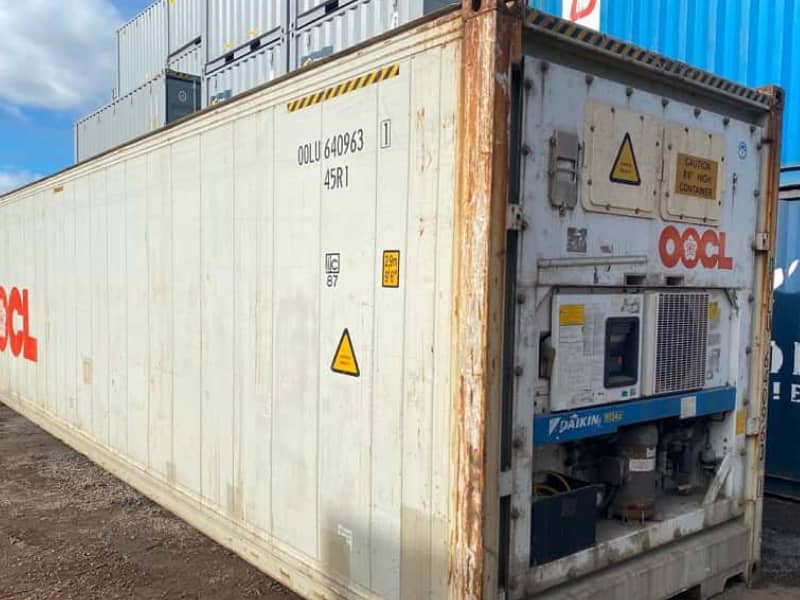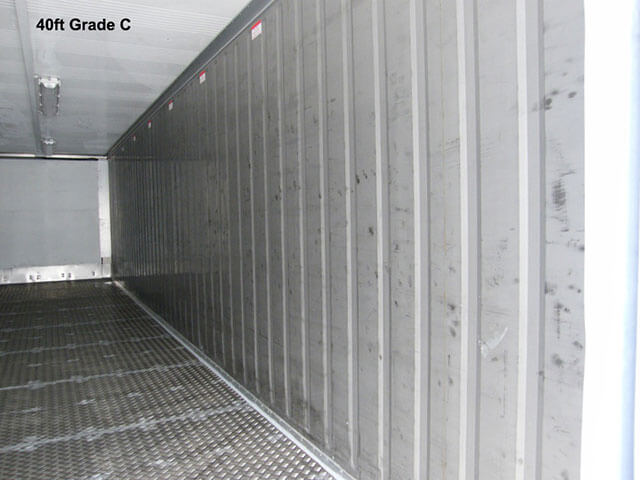All Concerning Freezer Containers: Crucial Insights for Your Storage Space Demands
Freezer containers play a crucial role in the conservation of subject to spoiling items. They can be found in different forms, consisting of refrigerated and shielded devices, each designed for certain storage space requirements. Understanding the benefits and essential attributes of these containers is important for businesses aiming to enhance their operations. As the need for reliable storage space options grows, exploring the different alternatives offered can lead to informed decisions that impact both success and sustainability. What variables should one consider when picking the appropriate container?
Kinds Of Freezer Containers
Cold storage space containers can be found in various types, each made to satisfy specific temperature control needs. Amongst one of the most usual types are cooled containers, which keep temperature levels in between 0 ° C to 10 ° C, making them suitable for subject to spoiling goods like fruits, vegetables, and milk products. Another kind is the deep fridge freezer container, which operates at temperature levels listed below -18 ° C, ideal for lasting storage of icy things such as meats and seafood.
Insulated containers give temperature level stability without active air conditioning, making them helpful for temporary transportation of temperature-sensitive items. Additionally, there are portable cold store systems, which use versatility in locations and are frequently used in events or seasonal operations. Blast refrigerators quickly minimize the temperature of hot foods, making sure security and top quality. Each kind offers a special function in numerous sectors, from food service to pharmaceuticals, stressing the significance of picking the right container for particular storage demands.

Benefits of Using Cold Store Solutions

Furthermore, cool storage options prolong the rack life of products, reducing waste and boosting earnings for businesses. By effectively taking care of stock with proper temperature level control, firms can enhance their supply chains and enhance functional performance.
In addition, freezer centers enable flexible storage choices, suiting different quantity needs and seasonal variations sought after (used 40ft refrigerated shipping containers). This adaptability helps services respond quickly to market adjustments
Using chilly storage services can ensure conformity with health and safety regulations, securing both consumers and services. Overall, the strategic use of chilly storage enhances item monitoring while advertising sustainability and economic practicality.
Key Functions to Seek in Freezer Containers
When picking cool storage space containers, numerous essential features advantage mindful factor to consider to safeguard peak performance and dependability. Temperature level control capacities are vital; containers must preserve regular temperature levels appropriate for particular products. Insulation high quality likewise plays a considerable role, as premium insulation lowers energy usage and enhances temperature level security.
Next, ease of gain access to and loading is critical; containers should offer user-friendly designs for effective handling and organization. Toughness is an additional vital element; weather-resistant materials guarantee longevity and guard contents versus ecological aspects.
Furthermore, flexibility attributes, such as built-in wheels or raising points, facilitate transport, while customizable designs enable tailored storage remedies.
Monitoring systems, consisting of temperature level alarm systems and remote monitoring, provide real-time updates, making specific that conditions stay excellent. By concentrating on these attributes, individuals can pick cold store containers that meet their operational needs successfully.
Selecting the Right Cold Store Container for Your Requirements
Selecting the appropriate freezer container calls for a thoughtful analysis of operational requirements and specific requirements. Variables such as the kind of items being kept, temperature level level of sensitivity, and volume needs to be prioritized. Disposable food products might require containers with rigorous temperature level controls, while drugs might need exact conditions to maintain efficiency.
Additionally, possible individuals must take into consideration the container's dimension and mobility. A larger device may be essential for mass storage space, while smaller sized, mobile options could be excellent for short-lived or on-site requirements. Insulation quality and power performance are also vital, as these will impact operational costs and temperature security.
Last but not least, conformity with market regulations and requirements is important, especially in industries like food and healthcare. By meticulously assessing these elements, individuals can pick a cool storage space container that effectively meets their special needs and warranties optimum storage conditions.
Finest Practices for Keeping Cold Storage Conditions
Maintaining suitable freezer conditions is necessary for maintaining the high quality and safety and security of temperature-sensitive products. Regularly checking temperature and moisture degrees is critical; using trusted electronic thermostats and hygrometers can provide precise analyses. Furthermore, correct insulation of cool storage space containers aids lessen temperature level fluctuations and power loss.
Implementing a first-in, first-out (FIFO) system ensures that older inventory is made use of prior to more recent stock, decreasing waste (used 40ft refrigerated shipping containers). In addition, maintaining an organized layout within the storage area permits far better airflow and lessens the risk of cross-contamination
Routine maintenance look at devices, such as compressors and seals, are necessary to stop malfunctions. Staff training on finest methods for loading and discharging products assists keep temperature level honesty. Keeping doors closed as much as possible restrictions heat exchange, guaranteeing that the cold storage space atmosphere remains stable and efficient in protecting beneficial products.
Cost Considerations for Cold Storage Space Solutions
When evaluating cold store options, it is vital to think about the preliminary investment prices alongside ongoing operational costs. A comprehensive break down of these costs can expose substantial long-lasting financial savings possibility for companies. Comprehending these financial aspects helps stakeholders make educated choices regarding their freezer demands.

Initial Financial Investment Prices
The financial landscape of cold store containers presents numerous initial investment costs that services should think about. These expenses generally consist of the purchase or rental rate of the containers, which can differ based upon insulation, dimension, from this source and kind top quality. Additionally, expenditures connected to retrofitting existing frameworks to fit cold storage has to be factored in, specifically if specialized equipment is required. Installation costs, consisting of electrical job and refrigeration systems, also add to the overall initial financial investment. Services need to not ignore transportation costs for providing containers to their desired place. Finally, prospective customization options, such as shelving or temperature level tracking systems, can further impact the first monetary expense. Cautious budgeting for these aspects is necessary for successful freezer execution.
Functional Expenditures Breakdown
Functional Read Full Article expenditures for cold store options include a number of vital cost considerations that services have to navigate. Secret factors include energy costs, which can be significant due to the need to preserve low temperatures. Maintenance costs are likewise substantial, as routine maintenance is necessary to guarantee equipment operates efficiently and remains certified with health and wellness requirements. Furthermore, labor costs may develop from the demand for specialized staff to monitor the storage space and take care of setting. Insurance policy costs are another factor to consider, as firms must secure their financial investments against prospective losses. Any type of prospective governing compliance prices should be factored in, as services may need to spend in systems that stick to food safety and security and environmental guidelines. Understanding these costs is vital for reliable budgeting.
Long-Term Savings Prospective
Buying cold storage space services provides considerable lasting savings possibility, transforming first expenditures right into financial effectiveness over time. By lessening perishing and waste, services can enhance their revenue margins significantly. Advanced insulation and energy-efficient systems lower utility expenses, which collect over the lifespan of the devices. Furthermore, freezer containers typically call for less constant upkeep contrasted to typical refrigeration approaches, bring about lower repair costs. The ability to shop products for extended durations without compromising quality allows organizations to take advantage of market fluctuations, optimizing income. Additionally, the scalability of freezer remedies enables firms to adjust to altering needs without sustaining extreme expenses. On the whole, these variables add to a compelling instance for cold store as an economical investment strategy.
Often Asked Inquiries
Exactly How Long Can Food Be Saved in Cold Store Containers?
The period food can be kept in freezer containers varies by kind. Generally, subject to spoiling products last from days to weeks, while icy foods can stay safe for months, depending on proper temperature level and storage problems.
Are Cold Store Containers Energy-saving?
The energy performance of freezer containers varies based on design and insulation quality. Modern systems often use innovative technology to decrease power intake, eventually contributing to reduced functional prices and ecological influence in long-term usage.
Can Cold Store Containers Be Personalized for Details Needs?
Cold store containers can certainly be personalized Read Full Report to fulfill certain needs. Alterations may consist of temperature controls, size modifications, and added functions, permitting users to tailor remedies properly for various storage requirements and functional preferences.
What Are the Common Dimensions of Cold Store Containers?
Cold store containers typically can be found in standard dimensions such as 10, 20, and 40 feet. These dimensions accommodate different storage demands, guaranteeing adaptability for services needing temperature-controlled environments for delicate materials or perishable items.
Do Cold Store Containers Require Special Licenses for Usage?
Freezer containers typically need special licenses for use, relying on regional policies and intended applications. Authorities might mandate permits to guarantee safety and security requirements, ecological compliance, and correct functional techniques are maintained throughout their use.
Cold storage containers come in various types, each developed to fulfill particular temperature control demands. Additionally, cold storage centers allow for adaptable storage options, fitting different quantity requirements and seasonal variations in need. Choosing the ideal chilly storage container calls for a thoughtful evaluation of operational needs and particular demands. The economic landscape of cool storage space containers offers various initial financial investment prices that services should consider. Cold storage space containers can without a doubt be personalized to fulfill certain needs.